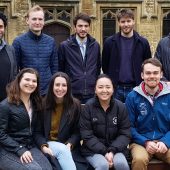
Dr Taha Yasseri
Former Senior Research Fellow
Taha Yasseri analyses large-scale transactional data to understand human dynamics, collective behaviour, collective intelligence and machine intelligence.
Citizen Science is research undertaken by professional scientists and members of the public collaboratively. The best example of it is Zooniverse.
Since it first launched as a single project called Galaxy Zoo in 2007, the Zooniverse has grown into the world’s largest citizen science platform, with more than 25 science projects and over 1 million registered volunteer citizen scientists. While initially focused on astronomy projects, such as those exploring the surfaces of the moon and the planet Mars, the platform now offers volunteers the opportunity to read and transcribe old ship logs and war diaries, identify animals in nature capture photos, track penguins, listen to whales communicating and map kelp from space.
We have been running a project to reveal the taxonomy and ecology of contributions to the Zooniverse. The project is now towards its end. And we have just released the first short report:
After dinner: the best time to create 1.5 million dollars of ground-breaking science
Count this! In celebration of the International Year of Astronomy 2009, NASA’s Great Observatories. Image: Nasa Marshall Space Flight Center.